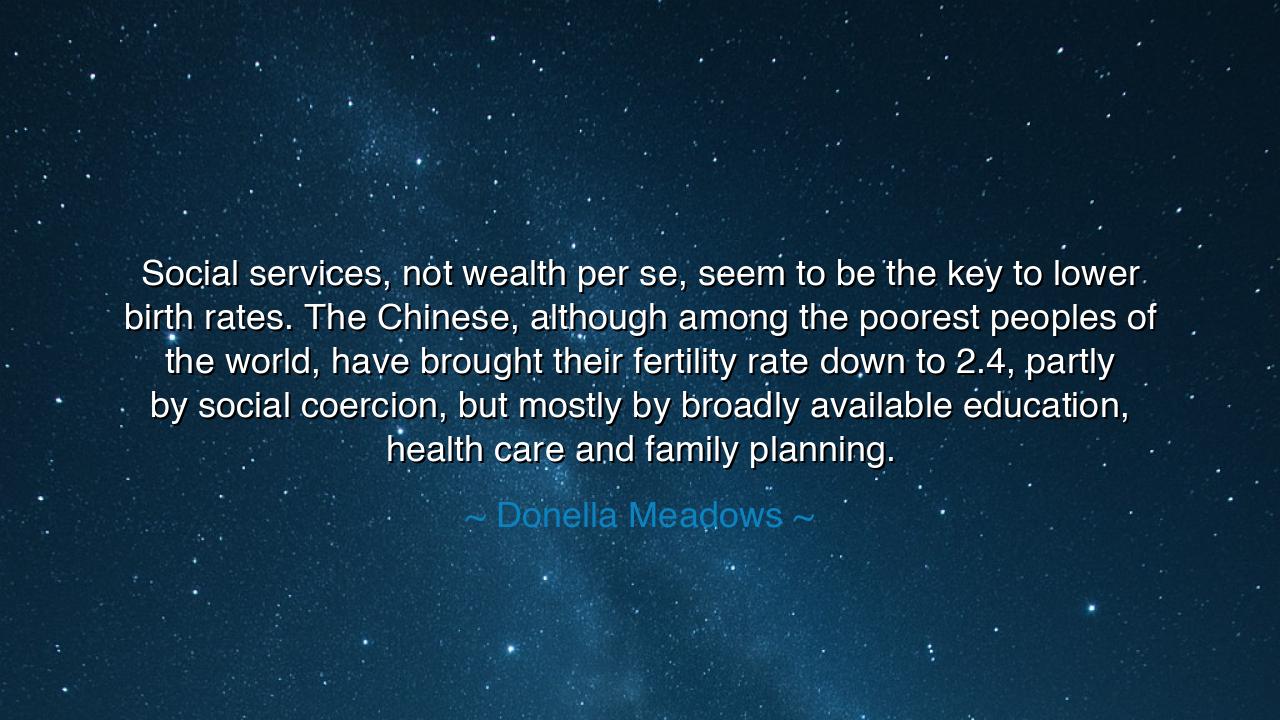
Social services, not wealth per se, seem to be the key to lower
Social services, not wealth per se, seem to be the key to lower birth rates. The Chinese, although among the poorest peoples of the world, have brought their fertility rate down to 2.4, partly by social coercion, but mostly by broadly available education, health care and family planning.






The words of Donella Meadows, spoken with the clarity of a thinker who gazed deeply into the forces shaping civilizations, resound with timeless wisdom: “Social services, not wealth per se, seem to be the key to lower birth rates. The Chinese, although among the poorest peoples of the world, have brought their fertility rate down to 2.4, partly by social coercion, but mostly by broadly available education, health care and family planning.” Here, she unmasks a truth often hidden by the illusions of wealth—that it is not riches alone that shape the destiny of nations, but the provision of education, health, and planning, those quiet pillars of human dignity and stability.
The heart of her statement lies in the recognition that prosperity without support is hollow. Gold and silver may fill the treasuries of kings, but if the people are denied schools, hospitals, and guidance, their lives remain trapped in cycles of poverty, sickness, and unchecked population growth. It is not wealth itself that brings balance, but the wise distribution of resources into the services that empower individuals to make decisions about their own lives. Social services are the true wealth of a nation, for they give not only survival but also freedom.
History bears witness to this truth. In the nineteenth century, as Europe industrialized, birth rates remained high among the poor, who lacked access to education and medical care. But as governments expanded public schooling and health systems, families gradually chose to have fewer children. Knowledge, health, and security replaced the need for large households that once were a defense against hunger and loss. In this way, the falling fertility rates were not the fruit of riches alone, but of services that gave families confidence in the future.
Meadows speaks directly of China, whose story illustrates her wisdom. Though among the poorest nations for much of the twentieth century, China reduced its fertility not by wealth but by building networks of clinics, schools, and community programs that reached even the rural poor. Yes, coercion played its role, but Meadows emphasizes the greater cause: access to education and health care gave women and families the power to decide. This pattern has been seen across the globe—from Kerala in India to nations of Latin America—where investments in social services led to lower birth rates even when wealth was scarce.
The deeper meaning of Meadows’s words is that true development is measured not by riches, but by empowerment. A society that seeks only to accumulate wealth while neglecting its people will find itself weighed down by instability, inequality, and unsustainable growth. But a society that builds schools, hospitals, and systems of planning invests in the most enduring capital of all: the well-being and wisdom of its citizens. Wealth may vanish in wars and markets, but knowledge and health endure for generations.
Her teaching is also a warning: to chase wealth without justice is to plant seeds of decline. For it is not the glitter of riches but the quiet strength of services that gives people the confidence to build smaller families and brighter futures. Leaders who boast of economic growth while their people lack education and care build castles on sand. Leaders who invest in social services build fortresses of stability that even time cannot easily erode.
The lesson for us is clear and commanding: if we would see balance in the world—stable populations, healthier societies, and a more just future—we must champion education, health care, and family planning above mere accumulation of wealth. Parents must demand schools for their children, citizens must guard the right to health, and communities must embrace knowledge as the path to freedom. For when people are given the tools to choose, they will choose wisely.
Therefore, O listener, remember the wisdom of Donella Meadows: it is not wealth, but services, that unlock the gates of progress. Let nations, leaders, and citizens alike learn this truth: that a school is worth more than a treasury, a clinic more than a vault of gold, and knowledge more than all the jewels of kings. Build these, and a people will flourish; neglect them, and even the richest nation will stumble into ruin. For true wealth is measured not in coins, but in the health, wisdom, and dignity of the people.






AAdministratorAdministrator
Welcome, honored guests. Please leave a comment, we will respond soon